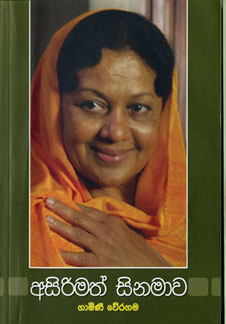Glory of cinema, a critic’s view
Asirimath Cinemava
Author: Gamini Weragama
Reviewed by Kalakeerthi
Edwin Ariyadasa
“I read every single review, because I love film criticism and I am
interested.”
Melanie Jayne Lynskey,
New Zealand actress
An emerging mass enthusiasm for Sinhala cinema has begun to raise new
hopes within those who deeply yearn for a sustained film culture in our
land.
 Mega cinematic phenomena of the calibre of ‘Aba’, “Mahindagamanaya,
“Siri Perakum”, “Vijaya – Kuveni” and of course the surprising film-epic
“Sri Siddhartha Gautama”, succeeded in criticising film–goers to cinemas
in teaming, thronging crowds that on many an occasion paid repeated
visits to re-live their original joy. Mega cinematic phenomena of the calibre of ‘Aba’, “Mahindagamanaya,
“Siri Perakum”, “Vijaya – Kuveni” and of course the surprising film-epic
“Sri Siddhartha Gautama”, succeeded in criticising film–goers to cinemas
in teaming, thronging crowds that on many an occasion paid repeated
visits to re-live their original joy.
The devastating drought that had parched up the box-office at those
venues, theatrically presenting Sinhala films seemed at least partially
relieved by a welcome drizzle of shekels.
It has to be carefully noted that this freak swell of visitors to
Sinhala cinemas to view these jumbo film pageants does not in any way
represent the long-awaited dawn of a fully-fledged Sinhala cinema
culture.
Film culture
A film culture gets entrenched in a given community, when the
cinematic works associated with the lifestyle, thoughts, aspirations and
the mores specific to that human group begin to reflect those values
profoundly and creatively.
The people in the community should embrace their film tradition with
a patriotic fervour. Teachers, social leaders, above all the
film-critics should guide the cinematic tastes of the people, leading
them to higher echelons of film appreciation and aesthetic taste.
The film-critics are those who should enshrine the values relating to
our own culture of cinema in the hearts and souls of our people. If the
progress of our country towards a sustained film culture has been slow
and was at a tortoise-pace, most of the time – it is because we as a
nation have not been able to get the benefit of those who think
profoundly about various aspects of cinema.
We need responsible film-historians, cinema teachers are required in
adequate numbers. Those who can explore cinema aesthetics, are not
widely available. The effects of cinema on various layers of society
have not been systematically researched. Capacity-building in various
areas of professional cinema has been overlooked.
What has happened in the field of cinema in Sri Lanka especially in
the academic and professional area, does not seem to have encouraged the
formation of an urge to build a national cinema in our country with an
iconic influence.
In such a backdrop, the saving grace we possess, is a stray group of
dedicated film critics who have pursued their interest with an
unflagging verve.
A shining star in this limited coterie is Gamini Weragama. Over the
years, Gamini has performed with such uninterrupted regularity that he
is like a natural force that appears on cue come what may.
He contributes his views on cinematic works keeping pace with their
release.
His personal mode of viewing and reviewing films is so compelling
that a fan-following is always ready to give him a hearing, punctuating
their attention with an occasional encore-call.
Favours
Gamini has a forthright stance, towards the material he opts to look
at in his reviews. As he is not moved by an urge to curry favours with
any party, he has his say at times, with unmitigated directness,
courting controversy, as the inescapable outcome of that attitude.
In the present collection of the reviews, he focuses on 35 works that
span eight years from 2002 to 2010. He makes it quite clear in his
prefatory note that he does not provide these reviews as the last word
in ideal film criticism. His intention is to see that these views, lead
to a fruitful discourse on cinema.
His anthology opens with a review of director Vasantha Obeysekera's
Salelu Varama. The final ending is Vidu created by Ashoka Handagama.
Each of his review is carefully crafted, making it a pleasure to read
it through. This way, over and above the subject matter, the manner of
writing too is highly entertaining.
Some exceptionally significant films come within the scope of this
work. Although a film review may be thought of as an ephemeral literary
exercise, Gamini Weragama's incisive and analytical approach raises his
reviews to a classical stature. In consequence whether he likes it or
not, his critical essays on the films he has viewed, could very well
serve as exemplary material for those younger writers who attempt film
criticism.
Dynamism
He makes an objective observation about the renewed dynamism, that
the stream of film reviews has acquired in the recent past. According to
him, film criticism should form a bridge between the mass of film-goers
and cinema. And, this ‘bridge’, he feels, has awakened with a new vigour
in the past year or two. His views exude an encouraging optimism about
the quality of current film criticism.
But, he is of the view, that a wider-scoped discourse is essential to
widen the horizons of film criticism.
The typographical presence of his anthology – titled “The Miraculous
Cinema” - is impressively enhanced by the photograph of Sinhala cinema's
perennial star Malini Fonseka on the book-cover. As Gamini Weragama
achieves greater maturity and more profound wisdom, he may as far as I
can see, will get transformed into a film philosopher of Sri Lanka. |

